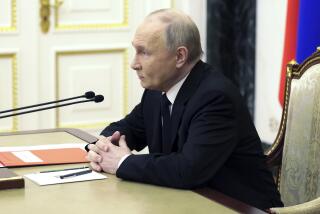U.S., Russia Approve Draft of Nuclear Treaty
- Share via
JAKARTA, Indonesia — Prospects for a global treaty banning nuclear weapon tests got a major boost here Tuesday with a joint statement by Russia and the United States calling for a compromise treaty draft to be approved as it is now written.
“The Russian Federation and the United States are prepared to support the draft treaty on the comprehensive banning of nuclear tests as it was proposed . . . although it does not fully satisfy both sides,” the two countries said in a statement read to reporters by Russian Foreign Minister Yevgeny M. Primakov.
The statement urged other nations to support the treaty, as is--without more negotiations--so that it may be approved by a disarmament conference that reopens Monday in Geneva. It could then be sent on to the U. N. General Assembly later this year for approval.
Secretary of State Warren Christopher, who appeared at the news conference with Primakov after a 90-minute meeting, described the statement as having “great significance.”
Earlier Tuesday, Indonesian Foreign Minister Ali Abdullah Alatas--who chairs a 21-member forum of Southeast Asian nations and major world powers--also endorsed quick conclusion of a test-ban treaty.
The forum, which meets annually to discuss regional issues, “called upon all states participating in the Conference on Disarmament, in particular the nuclear weapons states, to conclude, as a task of the highest priority, a universal and . . . verifiable comprehensive test-ban treaty,” Alatas said.
China and India, seen as the greatest potential blocks to a treaty, are represented in the forum but are not bound by the chairman’s entreaty.
U.S. officials said Christopher would discuss the proposed pact with the foreign ministers of China and India before leaving here Thursday for Australia.
China is the only nuclear power not observing a testing moratorium. But it has said it will stop testing by the end of this year. Asked if Washington expects Beijing to support the treaty as now drafted, a U.S. official replied: “I don’t think their position on this is crystal clear.”
India, which conducted a nuclear explosion years ago but says it is not a nuclear weapons state, has refused to support the treaty. India has objected to the accord because it does not commit the world’s declared nuclear powers--Britain, China, France, Russia and the United States--to a timetable for nuclear disarmament.
The current treaty wording was proposed June 28 by Dutch diplomat Jaap Ramaker, chairman of a special committee of the 61-nation Conference on Disarmament. Since then, there has been growing support for this draft to be the final one, U.S. officials said.
Although neither Washington nor Moscow is fully satisfied with the draft’s wording, their announcement Tuesday means they have decided to push for global consensus to end negotiations that imperil an agreement.
Tuesday morning, at the main session of the Regional Forum of the Assn. of Southeast Asian Nations (ASEAN), Christopher sharply criticized Myanmar’s military regime. Myanmar, formerly known as Burma, was admitted this year as a forum member.
The junta’s “refusal to heed the desire of a majority of the Burmese people for a transition to democratic rule and its increased harassment of the democratic opposition not only violates basic, universal human rights but raises the chance of instability, bloodshed and migration within Burma and across its borders,” Christopher said. “The steady deterioration of the rule of law has increased the threat that Burma’s burgeoning drug trade poses to citizens from Bangkok to Berlin, and Shanghai to San Francisco.”
More to Read
Sign up for Essential California
The most important California stories and recommendations in your inbox every morning.
You may occasionally receive promotional content from the Los Angeles Times.













